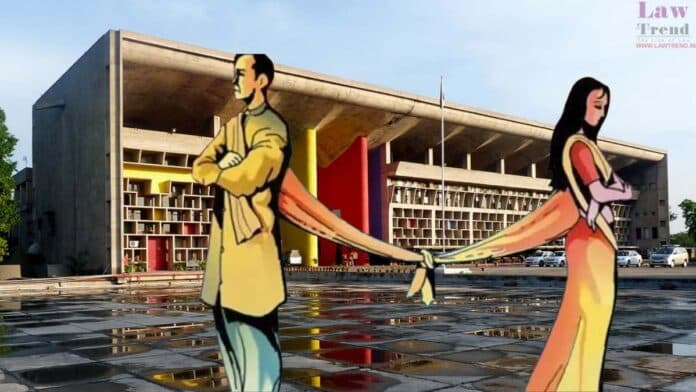In a landmark judgment, the Punjab and Haryana High Court recently granted a divorce in favor of a man, despite his conviction under Section 498-A of the Indian Penal Code (IPC), which deals with the cruelty faced by a woman from her husband or his relatives. The court also denied permanent alimony to the wife, citing her overall conduct.
The division bench comprising Justice Sureshwar Thakur and Justice Sudeepti Sharma observed that the wife’s actions, which included lodging an FIR against her husband, amounted to cruelty, making it impossible for them to live under the same roof.
Background of the Case
The couple was married in 2004 and had a child in 2005. In 2007, the wife lodged a police case under various sections of the IPC and the Dowry Prohibition Act against her husband. Subsequently, in 2009, the husband sought a divorce on the grounds of desertion and cruelty, which was rejected by the Family Court in 2018.
Challenging the Family Court’s decision, the husband submitted before the High Court that he and his wife had been living separately for 19 years. He argued that his conviction and sentence in the criminal case made it impossible for him to stay with his wife, whereas the wife argued that she was still ready and willing to stay with him.
Court’s Observations
The court highlighted that the filing of the FIR by the wife led to the conviction of her husband, which constituted mental cruelty on her part. The judges stated:
“A perusal of the present case shows that respondent-wife lodged an FIR against the appellant/husband, resulting in the appellant’s conviction. This action of respondent/wife constitutes cruelty, as it is practically impossible for the party against whom FIR is lodged or case is registered to live together under one roof. Consequently, this situation amounts to mental cruelty inflicted on the appellant/husband by the respondent/wife,” the court said.
The court also noted that the woman accused her in-laws of cruelty, but they were acquitted, adding to the claim of harassment faced by the husband’s family.
“Since the appellant/petitioner was convicted, though the parents were acquitted, the harassment faced by the family amounts to cruelty on the part of the respondent-wife,” it added.
Court’s Rationale
The High Court questioned the wife’s willingness to reconcile, stating that if she truly wanted to stay with her husband, she could have filed a petition for the restitution of conjugal rights instead of a criminal case.
“Learned Court below has dismissed the divorce petition on the ground that since the appellant instituted a petition for Restitution of Conjugal Rights in the year 2007, therefore, the acts of cruelty of respondent wife were condoned by the appellant/petitioner. Further that allegations of cruelty leveled by the appellant/petitioner against the wife remained unproved, whereas the Court did not observe that in fact it would amount to cruelty on the part of the respondent/wife,” the bench observed.
The High Court also pointed out the Family Court’s failure to comply with the mandatory provision for attempting reconciliation between the couple. Despite attempts to mediate, the husband remained unwilling to reconcile due to the conviction.
The court concluded that the marriage had irretrievably broken down, with no possibility of reconciliation or cohabitation after 19 years of separation.
“In the present case, the emotional foundation of the marriage has completely vanished. The course which has been adopted by the Family Court below would encourage continuous bickering, perpetual bitterness and may lead to immorality. If the Courts find that there is practically no possibility of their staying together and the marriage has been irretrievably broken as seen in the present case, then a decree of divorce should be granted,” the court declared.
Also Read
Although the court denied permanent alimony to the wife, it directed the husband to pay a monthly sum of ₹10,000 to their daughter.
“After the marriage of the daughter, both the parents shall be duty-bound to look into the needs of the daughter and to give love and affection to her,” the court ordered.
Senior Advocate GS Punia and advocate Harveen Kaur represented the husband, while Advocate Sarabjit Singh represented the wife.




